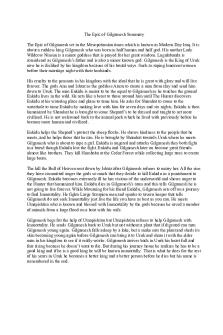the epic narrative of Gilgamesh and the character analysis PDF

| Title | the epic narrative of Gilgamesh and the character analysis |
|---|---|
| Author | Tionda Yarbrough |
| Course | World Literature I |
| Institution | Jackson State University |
| Pages | 3 |
| File Size | 59 KB |
| File Type | |
| Total Downloads | 9 |
| Total Views | 163 |
Summary
character analysis of the narrative Gilgamesh explaining how he was a terrible person and my understanding of his character....
Description
[Kirk Ford] [Professor Nedrick J. Patrick [ENG-205] [10/23/2021]
Gilgamesh Character Analysis
The Gilgamesh Epic chronicles the narrative of Gilgamesh, a terrible ruler who was born half human and half god. Gilgamesh is brutal to his peasants because he believes he is magnificent and will live forever. The gods Anu, Ishtar, and the goddess Aruru make a man out of clay and send him to Uruk. Enkidu is said to be the equal of Gilgamesh. Enkidu appears to people around him as a beast until The Hunter finds him and intends to tame him by having Shamhat meet and make love to him at the watering well. Shamhat then humanizes Enkidu, and he begins to aid and show compassion to the people. Shamhat transports him to Uruk, where he encounters Gilgamesh, preparing to rape a young woman. Enkidu gets enraged and assaults Gilgamesh, but Enkidu is defeated. Both guys eventually become close friends. After Gilgamesh refuses to marry Ishtar's Bull of Heaven, they slaughter it. The gods are so enraged by their transgressions that they resolve to slay Enkidu as a punishment for Gilgamesh. Enkidu dies in Gilgamesh's arms, indicating that he will not live forever. Gilgamesh embarks on a quest for immortality while grieving the loss of his companion Enkidu, who died in battle. He encounters Utnapishtim, who is well-known and has been granted immortality by
the gods. Gilgamesh asks Utnapishtim to assist him in attaining immortality, but he refuses. He sends Gilgamesh back to Uruk with an herb that, when digested, may restore Gilgamesh's youth. However, on his way home, he understands that he must be a good king and that if he is a good king, he will be remembered forever. That is what he does for the remainder of his time in Uruk; In the end, he attempts to be a better king and a better person before passing away, yet his name remains in the record books.
The epic of Gilgamesh provides a fascinating insight into the qualities of relationships that existed and how similar they are to those that exist now. Gilgamesh and his mother, Ninsun, had a connection that struck as quite similar. Even though Gilgamesh is the king of Uruk and Ninsun is a goddess, she still has many concerns for her son daily. Most of the epic has not been preserved, as seen by the ellipses and brackets; nonetheless, proof of her concerns has not been lost. "Ninsun listened long and with anguish" (Tablet III35) to Gilgamesh's preparations to combat the fearsome monster Humbaba, then "lifted her arms in appeal to the Sun God: 'Why did you torment my son Gilgamesh with such a restless spirit?" Even though several lines are lost during her pleas, we can see that she is appealing to the Sun God, Shamash, to keep Gilgamesh safe. Many of today's mother-son relationships are relatively similar; regardless of color, religion, or career, a mother will worry about her children anytime they are gone. The mother will pray, beg, and do anything she can to keep her kid-safe.
Another theme I saw throughout the book was the power of love as a motivator. In Gilgamesh, love drives transformation. To Gilgamesh, Enkidu transforms from a wild guy to a nobleman, while Gilgamesh transforms from a bully and tyrant to a king and hero. Enkidu checks Gilgamesh's restless, forceful energy, while Gilgamesh pulls Enkidu out of his selfcenteredness since they are equally matched. Gilgamesh's relationship with Enkidu allows him to empathize with the interests of his people. In the first part of the epic, the men's love for one other makes Gilgamesh, a better man, and when Enkidu dies, Gilgamesh's sorrow and dread drive him to seek immortality....
Similar Free PDFs

The Epic of Gilgamesh - homework
- 1 Pages

The Epic of Gilgamesh Summary
- 1 Pages

The Epic of Gilgamesh – Prompt 1
- 3 Pages

Epic of Gilgamesh Essay
- 3 Pages

30 - Epic of Gilgamesh excerpt
- 4 Pages

The Jungle character analysis
- 3 Pages
Popular Institutions
- Tinajero National High School - Annex
- Politeknik Caltex Riau
- Yokohama City University
- SGT University
- University of Al-Qadisiyah
- Divine Word College of Vigan
- Techniek College Rotterdam
- Universidade de Santiago
- Universiti Teknologi MARA Cawangan Johor Kampus Pasir Gudang
- Poltekkes Kemenkes Yogyakarta
- Baguio City National High School
- Colegio san marcos
- preparatoria uno
- Centro de Bachillerato Tecnológico Industrial y de Servicios No. 107
- Dalian Maritime University
- Quang Trung Secondary School
- Colegio Tecnológico en Informática
- Corporación Regional de Educación Superior
- Grupo CEDVA
- Dar Al Uloom University
- Centro de Estudios Preuniversitarios de la Universidad Nacional de Ingeniería
- 上智大学
- Aakash International School, Nuna Majara
- San Felipe Neri Catholic School
- Kang Chiao International School - New Taipei City
- Misamis Occidental National High School
- Institución Educativa Escuela Normal Juan Ladrilleros
- Kolehiyo ng Pantukan
- Batanes State College
- Instituto Continental
- Sekolah Menengah Kejuruan Kesehatan Kaltara (Tarakan)
- Colegio de La Inmaculada Concepcion - Cebu









